On this Day in History ... 14th February
14 Feb is in February.
1308 Coronation of Edward II and Isabella
1318 Death of Queen Consort Margaret of France
1544 Wyatt's Rebellion Executions
1547 Funeral of King Henry VIII
1575 Coronation and Marriage of Henry III King France
1613 Marriage of Elizabeth Stewart and Frederick V Elector Palatine
Calendars. 08 Feb 1308 King Edward II of England (age 23). Dover, Kent [Map]. To William Leybourne. Order to attend the king's coronation with his wife on Sunday next after the feast of St Valentine.
The like to seventy others in various counties.
Events on the 14th February
On 14 Feb 1117 Bertrade Montfort Queen Consort France (age 47) died.
Chronica Majora. After 14 Feb 1237. About this time William, bishop elect of Valentia, to whom the king (age 29) had entirely intrusted the reins of government, seeing that the nobles had, not without reason, conceived great indignation against him, on that account took his departure for his own country; his lands and rich farms, which the king had given him, he placed in the hands of Aaron, a Jew of York, in the form of a pledge, receiving from him, by way of loan, nine hundred marks of new sterling money in hand. He then directed his steps towards Dover, under the guidance of the king himself, with the packsaddles of his beasts of burden full of gold, silver, and divers royal presents, besides some desirable jennets and valuable saddle horses. And so cunningly had this man managed matters, that the king, abandoning the example set him by the noble emperor and the careful king of France, who did not permit their backs to be trodden upon by their wives and their relatives and countrymen, deprived and drained of all his money, and become a needy man, suffered this bishop to pull his kingdom to pieces, and, being under the influence of his wife (age 14), allowed him, on the least pretence, to consume the produce of his own temtories. He also allowed foreigners, - Poictevins, Germans, Provencals, and Romans, - to fatten themselves on the good things of the country, to the injury of his kingdom. The aforesaid bishop elect of Valentia then went to France, whence, after paying his respects to the king and his sister, he was without delay sent away in peace, and allowed to depart without any presents. He then sent the presents he had brought from England to Provence, and there distributed them, together with some horses loaded with an immense sum of money, and then returned empty lianded to England, where he was received by the king with open arms.

On 14 Feb 1318 Margaret of France Queen Consort England (age 39) died at Marlborough Castle [Map]. She was buried at Christ Church Greyfriars [Map]. Her tomb was destroyed during the Reformation.
On 14 Feb 1400 (exact date not known) King Richard II (age 33) died at Pontefract Castle [Map] where he had been imprisoned three months before; possibly murdered, possibly starved to death. His death was a consequence of the Epiphany Rising; he was still considered a threat. His first cousin Philippa Plantagenet Countess March 5th Countess Ulster de jure Heir to the Throne of England since she was the daughter of Lionel Plantagenet 1st Duke of Clarence. She at this time had four children with her husband Edmund Mortimer 3rd Earl March, Earl Ulster. The new King Henry IV (age 32) ignored her claim.



On 17 Feb 1400 Richard's (deceased) corpse was displayed at St Paul's Cathedral [Map].
On 06 Mar 1400 Richard's (deceased) remains were buried at King's Langley Priory, Hertfordshire [Map].
Chronicle of Gregory 1432. 14 Feb 1432. And yn Syn Volantynys day he come unto London; and he was worthely fette in to the cytte whythe the mayre and his aldyrmen whythe alle the worthy comyns of the cytte and every crafte in her devys.
And whenne the King (age 10) come to Londyn Brygge [Map] there was made a towre, and there yn stondynge a gy aunte welle arayde and welle be-sene, whythe a swerde holdynge uppe on hye, sayynge this reson in Latyn, Inimicos ejus induam confusione. And on every syde of him stode an antiloppe, that one holdynge the armys of Ingelond and that othyr the armys of Fraunce. Ande at the drawe brygge there was a nothyr ryalle toure, there yn stondynge iij empryssys ryally arayde, whythe crownys on her heddys, the whyche namys folowyn here: first, Nature; the secunde, Grace; the thyrde, Fortune, presentyng him whythe gyftys of grace. The first gaffe him Scyence an Cunnynge, and the secunde gaffe him Prosperyte and Eyches. And on the ryght syde of the emperyssys stode vij fayre maydyns clothide alle in whyte, i-powderyde whythe sonnys of golde, presentynge the kyng whythe vij gyftys of the Holy Goste in the lykenys of vij whyte dovys by fygure owtwarde, whythe this resonys: Impleat te Dominus spiritu1 sapiencie et intellectus, spiritu consitij etfortitudinis, sciencie et pietatys, spiritu timorys Domini. And on the lyfte syde of thes emperysse stode vi j othyr fay re maydyns in why the, powdery de why the sterrys of golde, presentyng the kyng whythe vij gyftys of worschyppe. The first was a crowne of glorye, the seconde with a cepter of clennysse, the iij whythe a swyrde of ryght and vyctorye, the iiij whythe a mantelle of prudence, the v whythe a schylde of fay the, the vj an helme of helme, the vij a gyrdylle of love and of parfyte pes. And this maydens song an hevynly songe unto the King of praysynge and of his vyctorye and welle comynge home. And whenne he come unto Cornehylle, there yn the vij scyence, and every scyence schewynge his propyr corny ng wondyrly i-wroughte.
Note 1. spiritu. spiritus, MS.
On 14 Feb 1531 John Blount (age 62) died at Kinlet, Cleobury Mortimer [Map]. He was buried at Church of St John The Baptist, Kinlet [Map].
Monument to John Blount (age 62) and Catherine Peshall (age 47). Fluted Period. Lancastrian Esses Collar with Big Esses. Long bobbed hair, no facial hair. Bare hands; gauntlets at the right side of the legs. She wearing a short Gabled Headress. Chest tomb somewhat of the wrong period ie Renaissance suggesting this may be a replacement effigy, or re-used. Probably Richard Parker of Burton on Trent.
John Blount: Around 1469 he was born to Thomas Blount and Anne Croft at Kinlet, Cleobury Mortimer. Before 1498 John Blount and Catherine Peshall were married.
Catherine Peshall: In 1484 she was born to Hugh Peshall. In 1540 she died.
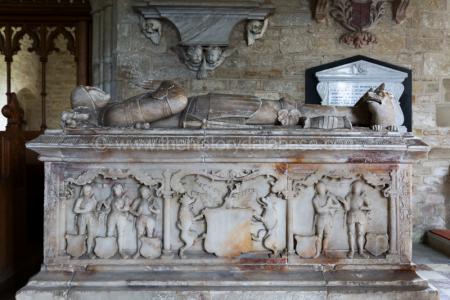
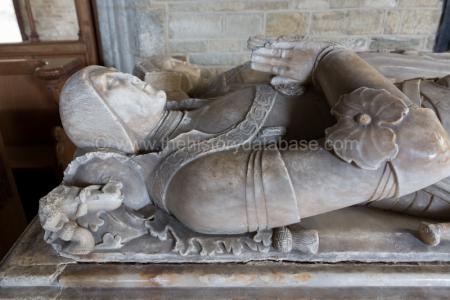
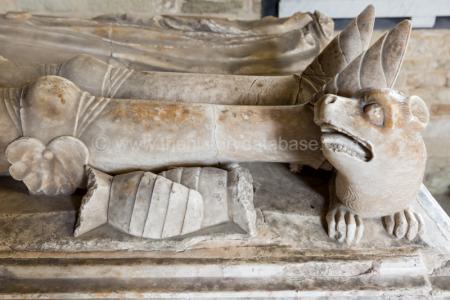
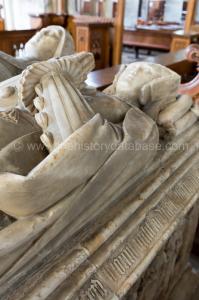
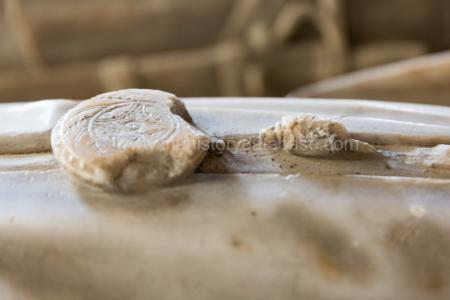
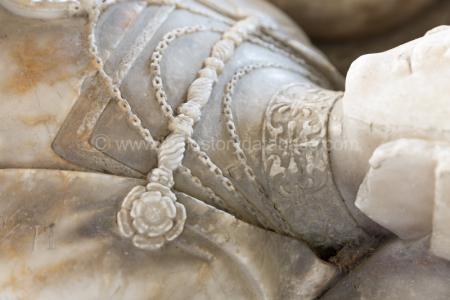
Henry Machyn's Diary. 14 Feb 1544. The xiiij day of Feybruary wher hangyd at evere gatt and plasse: in Chepe-syd vj; Algatt [Map] j, quartered; at Leydynhall [Map] iij; at Bysshope-gatt [Map] on, and quartered; Morgatt one; Crepullgatt [Map] one; Aldersgatt on, quartered; Nuwgat [Map] on, quartered; Ludgatt on; Belyngat iij hangyd; Sant Magnus iij hangyd; Towre hyll [Map] ij. hangyd; Holborne iij hangyd; Flettstret [Map] iij hangyd; at Peper alley gat iij; Barunsaystret iij; Sant Gorgus iij; Charyng crosse [Map] iiij, on Boyth the fottman, and Vekars of the gard, and ij moo; at Hydparke corner iij, on Polard a waterbeyrar; theys iij hanges in chynes; and but vij quartered, and ther bodys and heds set a-pon the gattes of London.
Wriothesley's Chronicle 14 Feb 1554. 14 Feb 1544. The 14 of February divers of the rebells were putt to death, that is to saye, Bothe, one of the Queenes footemen, one Vicars, a Yeoman of the Garde, great John Norton, and one Kinge, were hanged at Charinge Crosse [Map]. And three of the rebells, one called Pollarde, were hanged at the parke pale by Hide Parke; three allso in Fleet street, one at Ludgate, one at Bishopsgate [Map], one at Newgate [Map], one at Aldgate [Map], three at the Crosse [Map] in Cheape, three at Soper Lane ende in Chepe, and three in Smithfield [Map], which persons hanged still all that daye and night tyll the next morninge, and then cutt downe.a And the bodies of them that were hanged at the gates were quartered at Newgate [Map], and the heades and bodies hanged over the gates where they suffred.
Note a. The Grey Friares Chronicle (p. 88) adds "the whych ware of London that fled from the Dnke of Norfoke."
Annales of England by John Stow. The 14 of February the corpes of k Henrie the eight (deceased), was with great solemnitie and honor conveyed unto Syon [Map], and the next day to Windsor, and there buried in the colledge [Map].
On 14 Feb 1575 Henry III King France (age 23) and Louise Lorraine Queen Consort France (age 21) were married at Reims Cathedral; the day after his coronation. She by marriage Queen Consort France. He the son of King Henry II of France and Catherine Medici Queen Consort France (age 55). They were fourth cousins.
Before 14 Feb 1613 Frederick Palatinate Simmern V Elector Palatine Rhine (age 16) was appointed 408th Knight of the Garter by King James I of England and Ireland and VI of Scotland (age 46).
On 14 Feb 1613 Frederick Palatinate Simmern V Elector Palatine Rhine (age 16) and Princess Elizabeth Stewart Queen Bohemia (age 16) were married at Chapel Royal, Whitehall Palace. She the daughter of King James I of England and Ireland and VI of Scotland (age 46) and Anne of Denmark Queen Consort Scotland England and Ireland (age 38). He the son of Frederick IV Elector Palatine and Electress Louise Juliana of the Palatine Rhine (age 36).


A grand occasion that saw more royalty than ever visit the court of England. The marriage was an enormously popular match and was the occasion for an outpouring of public affection with the ceremony described as "a wonder of ceremonial and magnificence even for that extravagant age".
It was celebrated with lavish and sophisticated festivities both in London and Heidelberg, including mass feasts and lavish furnishings that cost nearly £50,000, and nearly bankrupted King James. Among many celebratory writings of the events was John Donne's (age 41) "Epithalamion, Or Marriage Song on the Lady Elizabeth, and Count Palatine being married on St Valentine's Day".
On 14 Feb 1642 Anne Rich Viscountess Mandeville (age 38) died. Monument at St Andrew's Church, Kimbolton [Map].
Anne Rich Viscountess Mandeville: In 1604 she was born to Robert Rich 2nd Earl Warwick and Frances Hatton Countess Warwick. On 01 Jul 1625 Edward Montagu 2nd Earl Manchester and she were married. She the daughter of Robert Rich 2nd Earl Warwick and Frances Hatton Countess Warwick. He the son of Henry Montagu 1st Earl Manchester and Catherine Spencer.
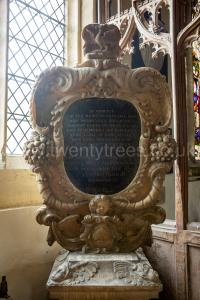
On 14 Feb 1663 James Scott 1st Duke Monmouth 1st Duke Buccleuch (age 13) was created 1st Duke Monmouth, 1st Earl Doncaster, 1st Baron Scott of Tynedale by King Charles II of England Scotland and Ireland (age 32).
Pepy's Diary. 14 Feb 1666. Thence with him to his paynter, Mr. Hales (age 66), who is drawing his picture, which will be mighty like him, and pleased me so, that I am resolved presently to have my wife's and mine done by him, he having a very masterly hand. So with mighty satisfaction to the 'Change [Map] and thence home, and after dinner abroad, taking Mrs. Mary Batelier with us, who was just come to see my wife, and they set me down at my Lord Treasurer's (age 58), and themselves went with the coach into the fields to take the ayre. I staid a meeting of the Duke of Yorke's (age 32), and the officers of the Navy and Ordnance. My Lord Treasurer (age 58) lying in bed of the gowte. Our business was discourse of the straits of the Navy for want of money, but after long discourse as much out of order as ordinary people's, we come to no issue, nor any money promised, or like to be had, and yet the worke must be done. Here I perceive Sir G. Carteret (age 56) had prepared himself to answer a choque of Sir W. Coventry (age 38), by offering of himself to shew all he had paid, and what is unpaid, and what moneys and assignments he hath in his hands, which, if he makes good, was the best thing he ever did say in his life, and the best timed, for else it must have fallen very foule on him.



On 14 Feb 1680 John Sidney 6th Earl of Leicester was born to Robert Sidney 4th Earl of Leicester (age 31) and Elizabeth Egerton Countess Leicester (age 26) at Penshurst Place, Kent [Map].

Evelyn's Diary. 14 Feb 1685. The King (deceased) was this, night very obscurely buried in a vault under Hen. 7th's Chapell at Westminster [Map], without any manner of pomp, and soone forgotten after all this vanity, and the face of the whole Court was exceedingly chang'd into a more solemn and moral behaviour; the new King (age 51) affecting neither prophanenesse nor buffoonery. All the greate Officers broke their staves over the grave, according to form.
On 14 Feb 1685 King Charles II of England Scotland and Ireland (deceased) was buried without any manner of pomp at Westminster Abbey [Map].
On 14 Feb 1736 Francis I Holy Roman Emperor (age 27) and Maria Theresa Habsburg Spain Holy Roman Empress (age 18) were married. She the daughter of Charles Habsburg Spain VI Holy Roman Emperor (age 51). He the son of Leopold Duke of Lorraine.
On 14 Feb 1752 James Hamilton 6th Duke Hamilton 3rd Duke Brandon (age 27) and Elizabeth Gunning Duchess Hamilton and Argyll (age 18) met at a Valentine's Ball at Bedford House Covent Garden. He and they (age 18) were married that night at Keith's Chapel, Mayfair; the location being one where he didn't require a license. This before the Marriage Act of 1753. She by marriage Duchess Hamilton, Duchess Brandon of Suffolk. He the son of James Hamilton 5th Duke Hamilton 2nd Duke Brandon and Anne Cochrane Duchess Hamilton Duchess Brandon.
Letters of Horace Walpole. 27 Feb 1752. I write this as a sort of letter of form on the occasion, for there is nothing worth telling you. The event that has made most noise since my last, is the extempore wedding of the youngest (age 18) of the two Gunnings, who have made so vehement a noise. Lord Coventry (age 29)295, a grave young lord, of the remains of the patriot breed, has long dangled after the eldest (age 19), virtuously with regard to her virtue, not very honourably with regard to his own credit. About six weeks ago Duke Hamilton (age 27)296, the very reverse of the Earl, hot, debauched, extravagant, and equally damaged in his fortune and person, fell in love with the youngest at the masquerade, and determined to marry her in the spring. About a fortnight since, at an immense assembly at my Lord Chesterfield's, made to show the house, which is really magnificent, Duke Hamilton made violent love at one end of the room, while he was playing at pharaoh at the other end; that is, he saw neither the bank nor his own cards, which were of three hundred pounds each: he soon lost a thousand. I own I was so little a professor in love, that I thought all this parade looked ill for the poor girl; and could not conceive, if he was so much engaged with his mistress as to disregard such sums, why he played at all. However, two nights afterwards, being left alone with her while her mother and sister were at Bedford House, he found himself so impatient, that he sent for a parson. The doctor refused to perform the ceremony without license or ring: the Duke swore he would send for the Archbishop-at last they were married with a ring of the bed-curtain, at half an hour after twelve at night, at Mayfair chapel297, The Scotch are enraged; the women mad that so much beauty has had its effect; and what is most silly, my Lord Coventry (age 29) declares that he now will marry the other.

Poor Lord Lempster has just killed an officer298 in a duel, about a play-debt, and I fear was in the wrong. There is no end of his misfortunes and wrong-headedness!-Where is Mr. Conway!-Adieu!
Note 295. George-William (age 29), sixth Earl of Coventry. He died in 1809, at the age of eighty-seven.-E.
Note 296. James, fourth Duke of Hamilton. He died in 1758.-D.
Note 297. On the 14th of February.-E.
Note 298. Captain Gray of the Guards (deceased). The duel was fought, with swords, in Marylebone Fields. Lord Lempster took his trial at the Old Bailey in April, and was found guilty of manslaughter.-E.
On 14 Feb 1773 Charles Brudenell 1st Marquess Ailesbury was born to Thomas Brudenell 1st Earl Ailesbury (age 43) and Susanna Hoare Countess Ailesbury (age 40).

On 14 Feb 1796 Samuel Pegge (age 91) died.
On 14 Feb 1809 Henry Arthur Cole was born to John Cole 2nd Earl Enniskillen (age 40) and Charlotte Paget Countess Enniskillen (age 27).
On 14 Feb 1822 Princess Victoria Saxe Coburg Gotha was born to Ferdinand Georg August Saxe Coburg Gotha (age 36) and Maria Antonia Koháry Csábrág.
On 14 Feb 1824 George Barrington 7th Viscount Barrington was born to William Keppel Barrington 6th Viscount Barrington (age 30) and Jane Elizabeth Liddell Viscountess Barrington (age 19) in Lower Brooke Street Brook Street.
On 14 Feb 1838 Valentine Cameron Prinsep was born to Henry Thoby Prinsep (age 45) and Sarah Monckton Pattle (age 21) in Calcutta, India.
On 14 Feb 1840 Benjamin Gott (age 77) died. He was buried at St Bartholomew's Church, Armley [Map] where there is a monument to him sculpted by his son Joseph Gott (age 54). The pink veined marble base has a darkened plaque with tribute which includes the words: '...he maintained with inflexible uprightness the character of a merchant with impartial justice the office of a magistrate and with unshaken confidence the warmth of friendship he was always ready to promote the welfare of the town of Leeds...'
On 14 Feb 1842 William Calder Marshall (age 28) and Marianne Lawrie were married at St Cuthbert's Church, Edinburgh. She died a month later.
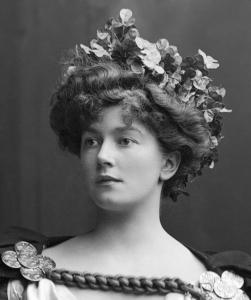 14 Feb 1900. James Lafayette (age 47). Detail of photograph of Sybil Mary St Clair-Erskine Countess of Westmorland (age 28)
14 Feb 1900. James Lafayette (age 47). Detail of photograph of Sybil Mary St Clair-Erskine Countess of Westmorland (age 28)
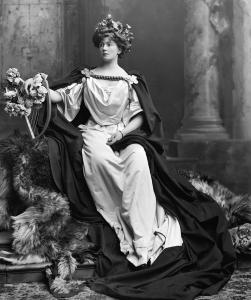 14 Feb 1900. James Lafayette (age 47). Photograph of Sybil Mary St Clair-Erskine Countess of Westmorland (age 28)
14 Feb 1900. James Lafayette (age 47). Photograph of Sybil Mary St Clair-Erskine Countess of Westmorland (age 28)
Keiller Collection Letters 14 Feb 1939. Nursling, Southampton,
14th February, 1939.
Dear Sir,
In your February number (p.10) Mr. Keiller (age 49), in his admirable article, quotes a statement that, when megalithic monuments like Stonehenge were built, the level of the Baltic and of the North Sea was 400 feet higher than now! (I need hardly say that Mr. Keiller (age 49) himself is far too sane to attach any importance to such a statement). But it seems at first glance to raise certain difficulties about the construction of Stonehenge. the level of the ground on which Stonehenge stands is about 340 feet above the present level of the sea. A simple calculation shows that it must have then been about 60 feet below the sea!
The explanation of this remarkable fact was mystically revealed to me by no less a person than the chief architect himself, the patriarch Noah. With characteristic frankness he told me of a difficulty that has escaped the notice of all the Biblical critics, and of the ingenious method by which he solved it. The heavy precipitation which resulted in the well-known Flood, consisted, of course, entirely of fresh water; and the fishes who for generations had been born and bred, so to speak, in salt water came to him in great distress, asking his advice. Not being a water expert himself, Noah consulted the Authorities and was told that only strenuous work could save the fish from becoming fossilized. He accordingly devised a scheme by which they should swim across the drowned continent of Eurasia and construct a temple to Jehovah upon the submerged uplands that are now called Salisbury Plain. In order to increase their labour and save them from extinction they were to use only the largest stones, and were to fetch some of them from distant Wales. They were supplied with blue prints by a well-known firm of Sumerian architects, specially drawn on waterproof paper by highly skilled crabs, with ink provided free of charge by cuttle-fish or squids. (It is interesting to note that precisely similar paper is still used by the Ordnance Survey for its small-scale maps). The task was duly carried out, and shortly after 4000 B. C. the temple was formally declared open by a bottle-nosed whale.
In every community, however, there are some recalcitrant individuals who refuse to take good advice, and so there were amongst the fishes. A little group of passive resisters was formed, and they occupied their time swimming round the ark cursing the Authorities. They said they would be fossilized before they would consent to do such menial work, and fossilized they were. When at length the Flood receded, the slopes of Ararat and all the land of Armenia was strewn with huge stone fish. They remain there to this day and may be seen by any who care to visit that country. There is a photograph of one in the Museum at Erivan. They are called VISHAPS and a fully illustrated account of them was recently published (Les Vishaps, by N. Y. Marr & J. I. Smirnov, Leningrad, 1931, reviewed in ANTIQUITY XI, 1937, 122-3).
This explanation is a Revelation in the strict sense of the word. It entirely supersedes the old theory that Stonehenge was built by the Apalachian Indians of North America and dedicated to Apollo1; and of course puts out of court the fantastic conclusions of archaeologists which are invariably built upon the insecure basis of ascertained fact. I might add that Noah informed me that he was always at the disposal of genuine seekers after knowledge, and that his best inspiration came from Chambery No. 5 served with pigs’ trotters, preferably at the Escargot d’Or.
Yours faithfully,
(signed) OGSC (age 52)
The Editor Modern Mystic 6 Bear Street, Leicester Square, W.C.2
Note 1. W. S. Blacket, Researches into the Lost Histories. of America, 1883, p. 193.
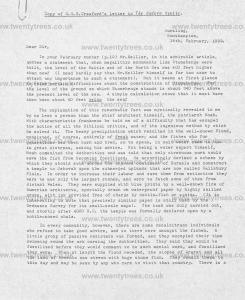
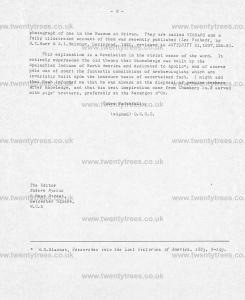
Births on the 14th February
On 14 Feb 1276 Charles Habsburg was born to Rudolph I King Romans (age 57) and Gertrude Hohenburg (age 51).
On 14 Feb 1313 Thomas Beauchamp 11th Earl Warwick was born to Guy Beauchamp 10th Earl Warwick (age 41) and Alice Tosny Countess Warwick (age 28) at Warwick Castle [Map].

On 14 Feb 1347 William Brereton was born to William Brereton (age 22) at Egerton [Map].
On 14 Feb 1408 John Fitzalan 14th Earl of Arundel was born to John Fitzalan 13th Earl of Arundel (age 22) and Eleanor Berkeley Countess Arundel (age 26) at Lytchett Maltravers, Dorset.

On 14 Feb 1437 Arthuse of Laval was born to Guy 14th de Laval Count (age 31) and Isabella Montfort (age 26). He was a twin with his brother Jean of Laval.
On 14 Feb 1437 Jean of Laval was born to Guy 14th de Laval Count (age 31) and Isabella Montfort (age 26). He was a twin with his sister Arthuse of Laval.
On 14 Feb 1515 Frederick III Elector Palatine was born to John II Count Palatinate Simmern (age 22).
On 14 Feb 1546 Mary Drury was born to Robert Drury (age 22) and Audrey Rich (age 16).
On 14 Feb 1580 Maria Habsburg Spain was born to Philip "The Prudent" II King Spain (age 52) and Anna of Austria Queen Consort Spain (age 30). Coefficient of inbreeding 21.27%.
On 14 Feb 1614 Bishop John Wilkins was born.
On 14 Feb 1625 William Booth was born to William Booth (age 30) and Vere Egerton (age 29).

On 14 Feb 1645 Johanna Saxe Gotha was born to Ernest "The Pious" Saxe Gotha I Duke Saxe Gotha (age 43) and Elisabeth Sophie Saxe Altenburg Duchess Saxe Gotha (age 25) at Gotha. Coefficient of inbreeding 3.17%.
On 14 Feb 1670 Ferdinando Forster was born to William Forster of Bamburgh Castle (age 34) and Dorothy Selby (age 23).
On 14 Feb 1675 Charlotte Paston was born to William Paston 2nd Earl of Yarmouth (age 21) and Charlotte Jemima Henrietta Maria Fitzroy Countess Yarmouth (age 25). She a granddaughter of King Charles II of England Scotland and Ireland.

On 14 Feb 1680 John Sidney 6th Earl of Leicester was born to Robert Sidney 4th Earl of Leicester (age 31) and Elizabeth Egerton Countess Leicester (age 26) at Penshurst Place, Kent [Map].

On 14 Feb 1685 Francis Lee was born to Edward Lee 1st Earl Lichfield (age 22) and Charlotte Fitzroy Countess Lichfield (age 20). He a grandson of King Charles II of England Scotland and Ireland.
On 14 Feb 1714 William Vane 2nd Viscount Vane was born to William Vane 1st Viscount Vane (age 31).
On 14 Feb 1716 George Carteret was born to John Carteret 2nd Earl Granville (age 25) and Frances Worsley Countess Granville (age 23).
On 14 Feb 1745 Sarah Lennox Lady Bunbury was born to Charles Lennox 2nd Duke Richmond (age 43) and Sarah Cadogan Duchess Richmond (age 39). She a great granddaughter of King Charles II of England Scotland and Ireland.

On 14 Feb 1755 Prince Charles Louis of Baden was born to Grand Duke Charles Frederick of Baden (age 26) and Caroline Louise of Hesse-Darmstadt (age 31).
On 14 Feb 1755 Henry Phipps 1st Earl Mulgrave was born to Constantine Phipps 1st Baron Mulgrave (age 32) and Lepell Hervey Baroness Mulgrave (age 31). He a great x 2 grandson of King James II of England Scotland and Ireland.
On 14 Feb 1762 Thomas Botfield was born to Thomas Botfield (age 24) and Margaret Baker (age 32).
On 14 Feb 1764 Charlotte Courtenay was born to William Courtenay 8th Earl Devon (age 21) and Frances Clack Countess Devon.
On 14 Feb 1764 Marcus Beresford was born to John Beresford (age 25) and Constantia Ligondes.
On 14 Feb 1767 Thomas Anson 1st Viscount Anson was born to George Adams aka Anson (age 35) and Mary Venables-Vernon (age 27). He was educated at Eton College [Map] and Oriel College, Oxford University.
On 14 Feb 1770 Penelope Cooke Countess Cardigan was born to George John Cooke (age 34) and Penelope Bowyer of Harefield Park, London (age 24).
On 14 Feb 1770 Karoline Luise Friederike Nassau Weilburg was born to Charles Christian Nassau Weilburg (age 35) and Carolina Orange Nassau (age 26). She a great granddaughter of King George II of Great Britain and Ireland.
On 14 Feb 1773 Charles Brudenell 1st Marquess Ailesbury was born to Thomas Brudenell 1st Earl Ailesbury (age 43) and Susanna Hoare Countess Ailesbury (age 40).

On 14 Feb 1784 Colonel Thomas Noel Hill was born to John Hill 3rd Baronet (age 43).
On 14 Feb 1785 Alexander Ramsay 2nd Baronet was born to Alexander Ramsay 1st Baronet (age 28) and Elizabeth Bannerman.
On 14 Feb 1791 William Lennox Bathurst 5th Earl Bathurst was born to Henry Bathurst 3rd Earl Bathurst (age 28) and Georgiana Lennox Countess Bathurst (age 25). He a great x 3 grandson of King Charles II of England Scotland and Ireland.
On 14 Feb 1794 Frank Abney-Hastings was born to Charles Hastings 1st Baronet (age 41) and Parnel Abney.
On 14 Feb 1801 Reverend Marcus Beresford was born to Reverend George de la Poer Beresford (age 35).
On 14 Feb 1809 Henry Arthur Cole was born to John Cole 2nd Earl Enniskillen (age 40) and Charlotte Paget Countess Enniskillen (age 27).
On 14 Feb 1811 Edward Pellew 3rd Viscount Exmouth was born to Pownoll Bastard Pellew 2nd Viscount Exmouth (age 24) and Eliza Harriet Barlow.
On 14 Feb 1813 William Henry Charles Wellesley was born to Reverend Gerald Valerian Wellesley (age 42) and Emily Maud Cadogan (age 39).
On 14 Feb 1815 David Cunliffe was born to Robert Henry Cunliffe 4th Baronet (age 29).
On 14 Feb 1816 Emily Mary Grimston Countess Craven was born to James Walter Grimston 1st Earl Verulam (age 40) and Charlotte Jenkinson Countess Verulam.
On 14 Feb 1822 Princess Victoria Saxe Coburg Gotha was born to Ferdinand Georg August Saxe Coburg Gotha (age 36) and Maria Antonia Koháry Csábrág.
On 14 Feb 1822 Richard William Penn Curzon Howe 3rd Earl Howe was born to Richard William Penn Curzon Howe 1st Earl Howe (age 25) and Harriet Georgiana Brudenell Countess Howe (age 23).
On 14 Feb 1824 George Barrington 7th Viscount Barrington was born to William Keppel Barrington 6th Viscount Barrington (age 30) and Jane Elizabeth Liddell Viscountess Barrington (age 19) in Lower Brooke Street Brook Street.
On 14 Feb 1824 George Truefitt was born to Francis Truefitt and Louisa Parnell.
On 14 Feb 1838 Valentine Cameron Prinsep was born to Henry Thoby Prinsep (age 45) and Sarah Monckton Pattle (age 21) in Calcutta, India.
On 14 Feb 1845 Reverend Arthur Alfred Wilmot was born to Henry Sacheverell Wilmot 4th Baronet (age 44) and Maria Mundy (age 37).
On 14 Feb 1847 Peniston Milbanke 9th Baronet was born to John Ralph Milbanke-Huskisson 8th Baronet (age 46).
On 14 Feb 1848 William Orr-Ewing 2nd Baronet was born to Archibald Orr-Ewing 1st Baronet (age 30) and Elizabeth Lindsay Reid.
On 14 Feb 1850 Leigh Hoskyns 11th Baronet was born to John Leigh Hoskyns 9th Baronet (age 33).
On 14 Feb 1852 Elisabeth Campbell was born to George Douglas Campbell 8th Duke Argyll (age 28) and Elizabeth Georgiana Leveson-Gower Duchess Argyll.
Before 14 Feb 1856 Florence Chetwynd was born to William Henry Chetwynd (age 44) and Blanche Chetwynd-Talbot (age 20).
On 14 Feb 1862 Hubert Ernest Valentine Duncombe was born to William Duncombe 1st Earl Feversham (age 33) and Mabel Violet Graham Countess Feversham (age 28). Coefficient of inbreeding 1.57%. 

On 14 Feb 1864 Blanche Maynard was born to Charles Henry Maynard (age 50).
On 14 Feb 1864 James Cleland Burns 3rd Baron Inverclyde of Castle Wemyss was born.
On 14 Feb 1865 Reverend Aubrey Neville St John-Mildmay 10th Baronet was born to Reverend Charles Arundell St John-Mildmay (age 44) and Harriet Louisa Neville-Grenville.

On 14 Feb 1875 Major Hubert James Cecil Rostron was born to Simpson Rostron of Beddington in Surrey.
On 14 Feb 1896 Brigadier Valentine Cecil Cavendish was born to Cecil Charles Cavendish (age 40) and Maud Henrietta Halliday at Cawnpore.
On 14 Feb 1900 Edward Marjoribanks was born to Archibald John Marjoribanks (age 38).
On 14 Feb 1924 Patricia Mountbatten 2nd Countess Mountbatten of Burma was born to Louis Mountbatten 1st Earl Mountbatten of Burma (age 23) and Edwina Ashley Countess Mountbatten Burma (age 22). She a great x 2 granddaughter of Queen Victoria of the United Kingdom.
On 14 Feb 1950 Richard James Dashwood 9th Baronet was born to Henry George Massy Dashwood 8th Baronet (age 41).
On 14 Feb 1954 Harry Orde-Powlett 8th Baron Bolton was born to Richard William Orde-Powlett 7th Baron Bolton (age 24) and Christine Helene Weld-Forester Baroness Bolton (age 21).
On 14 Feb 1954 Richard Scott 10th Duke of Buccleuch, 12th Duke of Queensbury was born to Walter Francis Montagu-Douglas-Scott 9th Duke Buccleuch 11th Duke Queensberry (age 30) and Jane McNeill Duchess of Buccleuch (age 24).
Marriages on the 14th February
After 14 Feb 1492 Thomas Brandon and Anne Fiennes Marchioness Berkeley were married. She a great x 4 granddaughter of King Edward III of England. 

On 14 Feb 1556 Ulrich Mecklenburg-Schwerin (age 28) and Elizabeth Oldenburg (age 31) were married. She the daughter of King Frederick I of Denmark and Sophie of Pomerania Queen Consort of Denmark and Sweden (age 58). They were half third cousin once removed.
On 14 Feb 1575 Henry III King France (age 23) and Louise Lorraine Queen Consort France (age 21) were married at Reims Cathedral; the day after his coronation. She by marriage Queen Consort France. He the son of King Henry II of France and Catherine Medici Queen Consort France (age 55). They were fourth cousins.
On 14 Feb 1588 John "Younger" Oldenburg Duke Schleswig Holstein Sonderburg (age 42) and Agnes Hedwig of Anhalt (age 14) were married. The difference in their ages was 27 years. He the son of Christian III King Denmark and Dorothea of Saxe Lauenburg Queen Consort Denmark and Norway.
On 14 Feb 1613 Frederick Palatinate Simmern V Elector Palatine Rhine (age 16) and Princess Elizabeth Stewart Queen Bohemia (age 16) were married at Chapel Royal, Whitehall Palace. She the daughter of King James I of England and Ireland and VI of Scotland (age 46) and Anne of Denmark Queen Consort Scotland England and Ireland (age 38). He the son of Frederick IV Elector Palatine and Electress Louise Juliana of the Palatine Rhine (age 36).


A grand occasion that saw more royalty than ever visit the court of England. The marriage was an enormously popular match and was the occasion for an outpouring of public affection with the ceremony described as "a wonder of ceremonial and magnificence even for that extravagant age".
It was celebrated with lavish and sophisticated festivities both in London and Heidelberg, including mass feasts and lavish furnishings that cost nearly £50,000, and nearly bankrupted King James. Among many celebratory writings of the events was John Donne's (age 41) "Epithalamion, Or Marriage Song on the Lady Elizabeth, and Count Palatine being married on St Valentine's Day".
On 14 Feb 1631 John Cope 3rd Baronet (age 22) and Elizabeth Fane (age 23) were married. She the daughter of Francis Fane 1st Earl of Westmoreland and Mary Mildmay Countess of Westmoreland (age 49). They were fourth cousins.

On 14 Feb 1655 John Perceval 1st Baronet (age 25) and Catherine Southwell were married.

On 14 Feb 1659 Henry Rich (age 17) and Christiana Riccard Baroness Berkeley (age 21) were married. He the son of Robert Rich 5th Earl Warwick 2nd Earl Holland (age 40) and Elizabeth Ingram Countess Holland (age 36).

On 14 Feb 1670 Samuel Grimston 3rd Baronet (age 27) and Elizabeth Finch (age 20) were married. She the daughter of Heneage Finch 1st Earl Nottingham (age 48) and Elizabeth Harvey Baroness Finch (age 43).
On 14 Feb 1723 James Hamilton 5th Duke Hamilton 2nd Duke Brandon (age 20) and Anne Cochrane Duchess Hamilton Duchess Brandon (age 17) were married. She by marriage Duchess Hamilton, Duchess Brandon of Suffolk. She the daughter of John Cochrane 4th Earl Dundonald. He the son of James Hamilton Duke Hamilton, 1st Duke Brandon and Elizabeth Gerard Duchess Brandon (age 43).
On 14 Feb 1733 John Spencer (age 24) and Georgiana Caroline Carteret (age 16) were married. She the daughter of John Carteret 2nd Earl Granville (age 42) and Frances Worsley Countess Granville (age 40). He the son of Charles Spencer 3rd Earl of Sunderland and Anne Churchill Countess Sunderland.


On 14 Feb 1736 Francis I Holy Roman Emperor (age 27) and Maria Theresa Habsburg Spain Holy Roman Empress (age 18) were married. She the daughter of Charles Habsburg Spain VI Holy Roman Emperor (age 51). He the son of Leopold Duke of Lorraine.
On 14 Feb 1745 Thomas Howard 2nd Earl of Effingham (age 31) and Elizabeth Beckford Countess Effingham (age 20) were married. She by marriage Countess of Effingham. He the son of Francis Howard 1st Earl of Effingham.

On 14 Feb 1752 James Hamilton 6th Duke Hamilton 3rd Duke Brandon (age 27) and Elizabeth Gunning Duchess Hamilton and Argyll (age 18) met at a Valentine's Ball at Bedford House Covent Garden. He and they (age 18) were married that night at Keith's Chapel, Mayfair; the location being one where he didn't require a license. This before the Marriage Act of 1753. She by marriage Duchess Hamilton, Duchess Brandon of Suffolk. He the son of James Hamilton 5th Duke Hamilton 2nd Duke Brandon and Anne Cochrane Duchess Hamilton Duchess Brandon.
On 14 Feb 1779 Henry Venables-Vernon 3rd Baron Vernon (age 31) and Elizabeth Rebecca Anne Sedley (age 22) were married.

On 14 Feb 1786 Robert Edward Petre 10th Baron Petre (age 22) and Mary Bridget Howard Baroness Petre (age 18) were married. They were third cousin once removed. He a great x 3 grandson of King Charles II of England Scotland and Ireland. 
On 14 Feb 1788 Thomas Brudenell 1st Earl Ailesbury (age 58) and Anne Elizabeth Rawdon Countess Ailesbury (age 35) were married. The difference in their ages was 23 years. She the daughter of John Rawdon 1st Earl Moira (age 67) and Elizabeth Hastings Countess Moira (age 56). He the son of George Brudenell 3rd Earl Cardigan and Elizabeth Bruce 3rd Countess Cardigan.

On 14 Feb 1811 Edward Bullock Douglas (age 36) and Harriet Bullock were married.
On 14 Feb 1815 Edward Dolman Scott 2nd Baronet (age 21) and Catherine Juliana Bateman Lady Scott (age 18) were married.
On 14 Feb 1826 Augustus Brydges Henniker 3rd Baronet (age 31) and Elizabeth Henniker-Major Lady Henniker were married. She by marriage Lady Henniker of Newton Hall in Essex. They were first cousin once removed.
On 14 Feb 1838 Jacopo Fitz James Stuart 15th Duke Alba 13th Duke Veragua 8th Duke Berwick (age 16) and María Francisca "Paca" Palafox Duchess Veragua Duchess Berwick Duchess Alba (age 13) were married at Madrid. She by marriage Duchess Veragua, Duchess of Liria, Duchess of Jérica, Duchess Berwick, Duchess Alba. He the son of Carlos Miguel Fitz James Stuart 12th Duke Veragua 7th Duke Berwick 14th Duke Alba and Rosalía Ventimiglia Duchess Veragua Duchess Berwick Duchess Alba (age 40). He a great x 5 grandson of King James II of England Scotland and Ireland. 
On 14 Feb 1842 William Calder Marshall (age 28) and Marianne Lawrie were married at St Cuthbert's Church, Edinburgh. She died a month later.
On 14 Feb 1944 Francis Hastings 16th Earl Huntingdon (age 43) and Margaret Lane Countess Huntingdon (age 36) were married. She by marriage Countess Huntingdon. He the son of Warner Hastings 15th Earl Huntingdon and Maud Margaret Wilson Countess Huntingdon (age 76).
On 14 Feb 1948 Friedrich Josias Saxe Coburg Gotha (age 29) and Denyse Henrietta Muralt were married. He a great grandson of Queen Victoria of the United Kingdom.
Deaths on the 14th February
On 14 Feb 1117 Bertrade Montfort Queen Consort France (age 47) died.
On 14 Feb 1167 Sancha Burgundy (age 10) died.
On 14 Feb 1252 Matthew Hussey of Harting and Standen (age 37) died.
On 14 Feb 1318 Margaret of France Queen Consort England (age 39) died at Marlborough Castle [Map]. She was buried at Christ Church Greyfriars [Map]. Her tomb was destroyed during the Reformation.
Around 14 Feb 1380 William de Moleyns (age 49) died.
Before 14 Feb 1388 William Bryan died.
Before 14 Feb 1388 Phillipe Bryan died.
On 14 Feb 1389 John Beauchamp (age 59) died at Bedford [Map].
On 14 Feb 1399 Nicholas Orsini Count (age 67) died.
On 14 Feb 1400 (exact date not known) King Richard II (age 33) died at Pontefract Castle [Map] where he had been imprisoned three months before; possibly murdered, possibly starved to death. His death was a consequence of the Epiphany Rising; he was still considered a threat. His first cousin Philippa Plantagenet Countess March 5th Countess Ulster de jure Heir to the Throne of England since she was the daughter of Lionel Plantagenet 1st Duke of Clarence. She at this time had four children with her husband Edmund Mortimer 3rd Earl March, Earl Ulster. The new King Henry IV (age 32) ignored her claim.



On 17 Feb 1400 Richard's (deceased) corpse was displayed at St Paul's Cathedral [Map].
On 06 Mar 1400 Richard's (deceased) remains were buried at King's Langley Priory, Hertfordshire [Map].
On 14 Feb 1406 David Fleming (age 81) died.
On 14 Feb 1408 William Bonville (age 76) died.
On 14 Feb 1439 Marie Valois died.
On 14 Feb 1459 Stephen Count Palatine Simmern 1385-1459-Zweibrücken (age 73) died. His son Frederick I Count Palatine Simmern (age 41) succeeded Count Palatine Simmern. Margaret Egmont Countess Palatinate Simmern (age 23) by marriage Countess Palatine Simmern. His son Louis I Count Palatine of Zweibrücken (age 35) succeeded Count Palatine of Zweibrücken.
In 1468 Thomas Fitzgerald 7th Earl Desmond and Thomas Fitzgerald 7th Earl of Kildare (age 47) attended Parliament in Drogheda [Map] to answer charges of treason. Both were found guilty and attain. Thomas Fitzgerald 7th Earl Desmond sought sanctuary in Drogheda Priory [Map] where he was captured by John "Butcher of England" Tiptoft 1st Earl of Worcester (age 40). On 14 Feb 1468 Thomas Fitzgerald 7th Earl Desmond was summarily beheaded. He was buried initially in St Peter's Church Drogheda [Map] then Christ Church Cathedral, Oxford, Dublin [Map]. Some accounts claim John "Butcher of England" Tiptoft 1st Earl of Worcester (age 40) also murdered two of his young sons. Thomas Fitzgerald 7th Earl of Kildare (age 47) escaped and was subsequently pardoned and attainder reversed when King Edward IV found Ireland was ungovernable without him. In 1470 Thomas Fitzgerald 7th Earl of Kildare (age 49) was appointed Lord Deputy of Ireland under George York 1st Duke of Clarence (age 28) which position he held until the Duke's death in 1478.


On 14 Feb 1491 Elizabeth Bonville Baroness Kyme (age 64) died.
On 14 Feb 1492 William Berkeley 1st Marquess Berkeley (age 66) died. Marquess Berkeley, Earl Nottingham, Viscount Berkeley extinct.
Baron Berkeley Feudal retained by the King.
Maurice Berkeley 3rd Baron Berkeley (age 57) succeeded 3rd Baron Berkeley. Isabel Meade 3rd Baroness Berkeley by marriage Baroness Berkeley.
On 14 Feb 1492 William Willoughby (age 62) died at Dudley, Worcestershire.
Around 14 Feb 1511 John Purefoy (age 65) died.
On 14 Feb 1531 John Blount (age 62) died at Kinlet, Cleobury Mortimer [Map]. He was buried at Church of St John The Baptist, Kinlet [Map].
Monument to John Blount (age 62) and Catherine Peshall (age 47). Fluted Period. Lancastrian Esses Collar with Big Esses. Long bobbed hair, no facial hair. Bare hands; gauntlets at the right side of the legs. She wearing a short Gabled Headress. Chest tomb somewhat of the wrong period ie Renaissance suggesting this may be a replacement effigy, or re-used. Probably Richard Parker of Burton on Trent.
John Blount: Around 1469 he was born to Thomas Blount and Anne Croft at Kinlet, Cleobury Mortimer. Before 1498 John Blount and Catherine Peshall were married.
Catherine Peshall: In 1484 she was born to Hugh Peshall. In 1540 she died.






On 14 Feb 1558 Edmund Croftes (age 38) died.
On 14 Feb 1572 Anne Vere Baroness Sheffield (age 50) died.
On 14 Feb 1587 Thomas Wentworth (age 65) died at Scrooby, Nottinghamshire.
On 14 Feb 1601 Thomas Lee (age 50) was hanged at Tyburn [Map].
Between 14 Feb 1614 and 21 Feb 1614 Catherine Jerningham (age 65) died.
On 14 Feb 1620 John Acland (age 68) died without issue. He was buried in Broad Clyst Church Broad Clyst, Devon. His heir was his seventy year old brother Hugh Acland (age 77) who survived him by two years.
On 14 Feb 1624 William Halliday (age 59) died. He was buried at St Lawrence Jewry.
Before 14 Feb 1627 Walter Ogilvy 1st Lord Ogilvy of Deskford (age 67) died.
On 14 Feb 1642 Anne Rich Viscountess Mandeville (age 38) died. Monument at St Andrew's Church, Kimbolton [Map].
Anne Rich Viscountess Mandeville: In 1604 she was born to Robert Rich 2nd Earl Warwick and Frances Hatton Countess Warwick. On 01 Jul 1625 Edward Montagu 2nd Earl Manchester and she were married. She the daughter of Robert Rich 2nd Earl Warwick and Frances Hatton Countess Warwick. He the son of Henry Montagu 1st Earl Manchester and Catherine Spencer.

After 14 Feb 1659 Henry Rich (age 17) died.
Before 14 Feb 1662 Edward Fortescue (age 47) died.
On 14 Feb 1694 Rebecca Clayton Countess Yarmouth (age 59) died.
On 14 Feb 1696 Charles Agar died in Gowran.
On 14 Feb 1714 Maria Luisa Savoy (age 25) died at Madrid.
On 14 Feb 1737 Charles Talbot 1st Baron Talbot (age 52) died at Lincoln's Inn Fields. His son William Talbot 1st Earl Talbot (age 26) succeeded 2nd Baron Talbot of Hensol in Glamorganshire. Mary Cardonnel Countess Talbot (age 18) by marriage Baroness Talbot of Hensol in Glamorganshire.
On 14 Feb 1745 Lucy Salusbury died.
On 14 Feb 1761 Richard Annesley 6th Earl Anglesey (age 68) died. Earl Anglesey and Baron Annesley Newport Pagnell Buckinghamshire extinct. His son Arthur Annesley 1st Earl Mountnorris (age 16) succeeded 8th Viscount Valentia, 6th Baron Altham.
Arthur Annesley 1st Earl Mountnorris (age 16) didn't succeed as 7th Earl Anglesey since his parent's secret marriage in September 1741 was not supported by sufficient evidence for the English House of Lords to accept his legitimacy. He was subsequently created Earl Mountnorris of Mountnorris Castle in Armagh more or less in compensation.
He succeeded to the Irish titles Viscount Valentia and Baron Altham since the Irish House of Lords did believe his legitimacy.
On 14 Feb 1763 Anne Somerset Countess Coventry (age 89) died at Snitterfield.
On 14 Feb 1773 John Wynn (age 71) died.
On 14 Feb 1777 Walter Calverley aka Blackett (age 69) died. Baronet Blackett of Claverley in Yorkshire extinct. He was buried at Calverley. His estates, in line with the will of William Blackett 2nd Baronet, passed to Thomas Wentworth 5th Baronet (age 50), the eldest surviving son of his aunt Diana Blackett Lady Wentworth.

On 14 Feb 1778 John Amherst (age 60) died in Gosport, Hampshire.
On 14 Feb 1789 Mary Thorpe 14th Baroness Cobham (age 72) died. Baron Cobham abeyant.
On 14 Feb 1796 Samuel Pegge (age 91) died.
On 14 Feb 1802 Very Reverend John Fountayne (age 88) died.
On 14 Feb 1811 Reverend Philip Wodehouse (age 65) died.
On 14 Feb 1815 George Frederick Sackville 4th Duke Dorset (age 21) died. His first cousin once removed Charles Sackville 5th Duke Dorset (age 47) succeeded 5th Duke Dorset, 11th Earl Dorset, 6th Earl Middlesex, 11th Baron Buckhurst, 6th Baron Cranfield of Cranfield in Middlesex.
On 14 Feb 1817 Euphemia Mackenzie died.
On 14 Feb 1830 Mary Ann Atkinson died at sea on their passage homewards from India. She was buried in the vault at St Andrew's Church Hartburn [Map] on 16 May 1830.
On 14 Feb 1835 Francis Basset 1st Baron Dunstanville 1st Baron Basset Stratton (age 77) died. His daughter Frances Basset 2nd Baroness Basset (age 53) succeeded 2nd Baroness Basset Stratton.
On 14 Feb 1840 Benjamin Gott (age 77) died. He was buried at St Bartholomew's Church, Armley [Map] where there is a monument to him sculpted by his son Joseph Gott (age 54). The pink veined marble base has a darkened plaque with tribute which includes the words: '...he maintained with inflexible uprightness the character of a merchant with impartial justice the office of a magistrate and with unshaken confidence the warmth of friendship he was always ready to promote the welfare of the town of Leeds...'
On 14 Feb 1848 Edward King (age 76) died.
On 14 Feb 1851 Captain George William St John-Mildmay (age 58) died.
On 14 Feb 1864 William Dyce (age 57) died.
On 14 Feb 1870 Reynold Abel Alleyne 2nd Baronet (age 80) died. His son John Gay Newton Alleyne 3rd Baronet (age 49) succeeded 3rd Baronet Alleyne of Four Hills in Barbados. Augusta Isabella Fitzherbert Lady Alleyne (age 41) by marriage Lady Alleyne of Four Hills in Barbados.
On 14 Feb 1886 George Weld-Forester 3rd Baron Forester (age 78) died. He was buried at Willey Church,, Shropshire. His brother Orlando Weld-Forester 4th Baron Forester (age 72) succeeded 4th Baron Forester of Willey Park in Shropshire.
On 14 Feb 1890 John Robert Townshend 1st Earl Sydney (age 84) died. Earl Sydney of Scadbury in Kent and Viscount Sydney extinct.
On 14 Feb 1893 Charles Wathen (age 59) died.
On 14 Feb 1901 Robert Tempest Tempest 3rd Baronet (age 65) died. His son Tristram Tempest Tempest 4th Baronet (age 36) succeeded 4th Baronet Ricketts of The Elms in Gloucestershire and Beaumont Leyes in Leicestershire.
On 14 Feb 1903 Archduchess Elisabeth Franziska of Austria (age 72) died.
On 14 Feb 1904 Hugh Cholmeley 3rd Baronet (age 64) died. His son Montagu Aubrey Rowley Cholmeley 4th Baronet (age 27) succeeded 4th Baronet Cholmeley of Easton in Lincolnshire. Mabel Janetta Waldo-Sibthorp Lady Cholmeley (age 26) by marriage Lady Cholmeley of Easton in Lincolnshire.
On 14 Feb 1911 Eustace Balfour (age 56) died.
On 14 Feb 1911 Algernon Francis Edward Seymour (age 2) died.
On 14 Feb 1916 Reginald Gervase Alexander (age 68) died.
On 14 Feb 1916 Matthew White Ridley 2nd Viscount Ridley (age 41) died. His son Matthew White Ridley 3rd Viscount Ridley (age 13) succeeded 3rd Viscount Ridley of Blagdon and Blyth in Northumberland, 3rd Baron Wensleydale of Blagdon and Blyth in Northumberland, 7th Baronet Ridley of Blagdon in Northumberland.
On 14 Feb 1918 Fitzalan Charles John Foley 6th Baron Foley (age 65) died. On 14 Feb 1918 His first cousin once removed Gerard Foley 7th Baron Foley (age 19) succeeded 7th Baron Foley of Kidderminster in Worcestershire.
On 14 Feb 1937 Arthur Trollope 13th Baronet (age 70) died. His third cousin once removed Frederick Farrand Trollope 14th Baronet (age 61) succeeded 14th Baronet Trollope of Casewick in Lincolnshire.
On 14 Feb 1950 Flore Anne Rawdon-Hastings (age 64) died.
On 14 Feb 1952 Gerald Ralph Desmond Browne 7th Earl of Kenmare (age 55) died. Earl Kenmare, Viscount Kenmare extinct.
On 14 Feb 1955 Villiers Geoffrey Cæsar Hawkins 6th Baronet (age 64) died.
On 14 Feb 1961 Irene Lubbock (age 74) died.
On 14 Feb 1964 George Arthur Ormsby-Gore 4th Baron Harlech (age 78) died. His son William David Ormsby-Gore 5th Baron Harlech (age 45) succeeded 5th Baron Harlech. Sylvia Thomas Baroness Harlech by marriage Baroness Harlech.
On 14 Feb 1968 Audrey Evelyn James (age 65) died.
On 14 Feb 1994 Margaret Lane Countess Huntingdon (age 86) died.
On 14 Feb 2016 Eric Lubbock 4th Baron Avebury (age 87) died. He was buried at St Giles' Church, Farnborough. His son Lyulph Lubbock 5th Baron Avebury (age 61) succeeded 5th Baron Avebury of Avebury in Wiltshire, 8th Baronet Lubbock of Lammas in Norfolk.